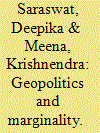| Srl | Item |
| 1 |
ID:
151207


|
|
|
|
|
| Summary/Abstract |
Theorisation in modern geopolitics is replete with instances where certain regions have been accorded a marginal status in various schemes of global political–geographical configurations. Geopolitical ideas propounded by Halford J. Mackinder, Nicholas Spykman and Saul B. Cohen are all evidence of geopolitical visualisation and ordering which advantage certain parts of the world by geo-graphing them as strategically important. This ordering disadvantages certain other areas as less important and, therefore, marginal in the context of international politics. The study here attempts to locate the ascription of marginality in modern geopolitics.
|
|
|
|
|
|
|
|
|
|
|
|
|
|
|
|
| 2 |
ID:
189370


|
|
|
|
|
| Summary/Abstract |
This article examines geopolitical responses to postcolonial films on the Internet Movie Database (IMDb). Maghrebi-French films Days of Glory (French: Indigenes) (2006), Outside the Law (French: Hors la loi) (2010) and Free Men (French: Les hommes libres) (2011) collectively re-tell Algerian histories of resistance and anti-colonialism in the Second World War and the Algerian War of Independence, using Hollywood combat and gangster genre to do so. This paper finds that the specific temporal and spatial narratives of (post)colonial France and Algeria are transformed and read geopolitically as allegories of more familiar conflict, namely the War on Terror, the Arab Spring and Israel-Palestine. Drawing on the fields of postcolonial theory and popular geopolitics, this article extends the scope of popular geopolitics to consider postcolonial film and its reception as a site of geopolitical contestation. In doing so, this article highlights how the reception of ‘foreign-language’ postcolonial stories in the Anglosphere is mediated by popular geopolitical frames of reference, and is dependent on the context of reception and (post)colonial power relations.
|
|
|
|
|
|
|
|
|
|
|
|
|
|
|
|